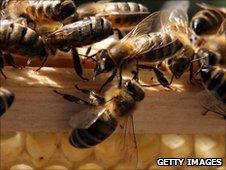Scottish university to study decline of honey bees
- Published

Scots scientists will look into why honey bee numbers are declining
Scientists at a Scottish university are to investigate the mystery of what is killing off honey and bumble bees.
The new research by Dundee University will look into whether pesticides are harming the brains of the bees.
The bee population has fallen by up to 15% over the two years to April 2009, while the population of butterflies and other insects is also down.
Bees are vital in the food chain as crop pollinators and it is feared their decline will impact on food production.
Researchers have been given £1.8m to examine if pesticides have affected the brain function of bees and whether they have damaged things like their navigation and foraging skills.
Brain activity
With the help of the Scottish Beekeepers Association, the Dundee scientists are expected to radio tag bees as part of the three-year study.
They are also due to work closely with their colleagues at Royal Holloway Hospital, London, the University of Newcastle and University College London.
Dr Chris Connolly, who is head of the research team, said he would be looking into the hypothesis that pesticides, while not killing bees, are affecting their life span and cognitive abilities.
He explained: "Many insecticides work by interfering with information flow in the brains of insects - either increasing or decreasing their brain activity.
"We will be looking at whether chronic exposure to chemicals used to control mites, combined with levels of agricultural pesticides that are not themselves lethal, may act together to magnify their affects on bee brain function."
Dr Connolly added: "It is believed that pesticides, when present in isolation, at the levels thought to exist in the environment, do not kill bees.
"Our hypothesis is that these chemicals may have a synergistic effect on the brain function of bees."
- Published26 May 2010